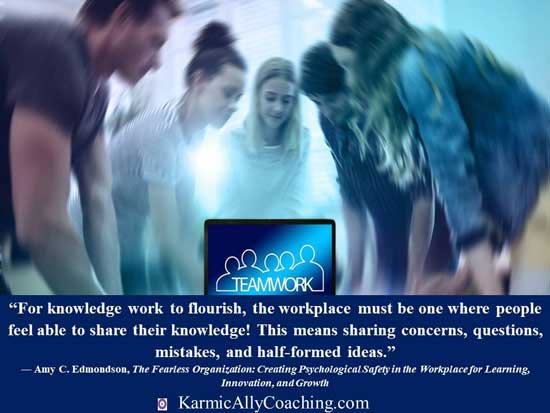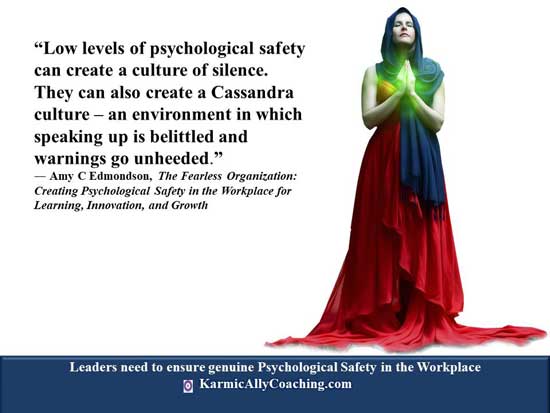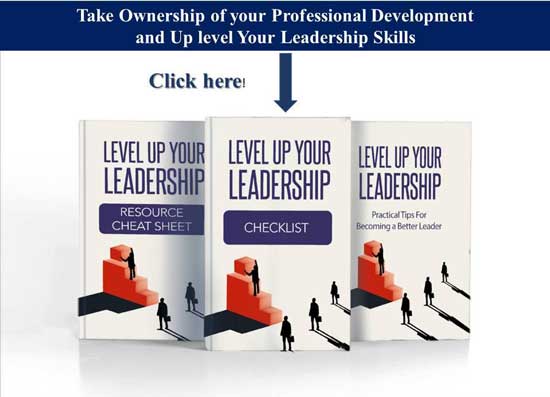This post has already been read 118 times!
Additional Resources:
Leadership Challenges you need to focus on in 2024 and beyond
AI in business brings benefits with hidden new challenges
Emotional Intelligence: The Basics for Professional Success
McKinsey Insights: Psychological Safety and the critical role of leadership development
Prefer to read? Here’s the transcript.

How safe do you feel in the workplace? I’m not just talking about physical safety though. This is about feeling safe to speak up and share your inputs for goals and projects.
In the first of this 3-part series on Leadership Challenges in 2024 and beyond, I spoke about the survey from the Society for Industrial and Organizational Psychology known as SIOP on the top leadership challenges for 2023 and beyond.
The survey noted the top 10 trends that leaders need to address while leading the changing workplace. So far, I’ve covered the need to create a diverse, inclusive and equity-based culture.
In the second of this series, we looked at technological developments and Artificial Intelligence.
In this session, I’m acknowledging a leader’s ability to engage and retain employees and talent. This skill has always been needed to be perceived as an adept and influential leader.
However, there is a new non-negotiable requirement now, especially in the post-pandemic era of leadership.
I’m referring to psychological safety in the workplace.
It’s a catchphrase you’d have heard or read. In all probability you’ve experienced it at some point of time yourself in the workplace. You may not have realized its importance in how it affected your feelings about your job. Or even the value you are providing to achieve team goals.
The first time I experienced the lack of psychological safety, I honestly didn’t know what had hit me.
We’d had a change of Finance Director at the company where I worked as the Finance Manager.
Ours was a small team of 4 professionals who were used to a Finance Director who listened to his team. We brainstormed solutions to problems and everyone felt they were adding value to the department.
That’s how we were able to implement a new accounting system in record time and set up controls and checks that even impressed our auditors.
Although part of the backend operations, we were respected by the operational staff and considered dynamic.
Then there was a change of top command when our expat Finance Director was transferred to another country. The new Finance Director had great credentials and we were excited.
That was until we noticed our team meetings were directions to do things the way the new boss wanted.
Any input to point out possible risks or limitations were met with his hitting his palm on his head. He’d hiss that we should not try to teach him his job and a lot more that I won’t repeat.

So we stopped giving recommendations and ideas and just did our work as dictated.
The ambiance of our department got disturbed. Team members were afraid to make mistakes or bring up problems and tough issues.
One member turned out to be a complete political animal and started to deliberately undermine other members.
A perfectly capable professional, he chose to become a squealer to the Finance Director making things difficult for the rest of us.
He was fired later on for his disruptive practices but that’s a story for another day.
Soon after, I was transferred to another department where my skill at financial close of projects was relevant. My place was taken by another Finance Manager who had worked with this man in his previous job.
He knew how to handle this Finance Director and acted as the buffer between him and the rest of the team. Input from the team was presented through the new manager in a way that made the Finance Director think that it was his idea.
Not the best way to work. At least the hitting forehead with palm and humiliating hissing business stopped.
Since our company was in the Petroleum and Energy sector, even the corporate and branch offices had to comply with Health & Safety procedures as the drilling sites. Our practices focused on physical safety and the odd session on CPR and other first aid practices.
That was 20 years ago. Nowadays, the concept of safety of employees and workers has broadened from that of physical safety.
Psychological safety is part of a healthy workplace.
But this isn’t just protecting the employee’s mental health or preventing psychological harm in a toxic work culture.
That’s a challenge for leaders too. Here, we are addressing psychological safety which is an important component of a psychologically healthy workplace.
It is a specific, targeted concept critical for innovation and success. In this true story, our team ceased to be innovative in the absence of psychological safety.
In her book, The Fearless Organization: Creating Psychological Safety in the Workplace for Learning, Innovation, and Growth, Amy Edmondson, PhD, the Novartis professor of leadership and management at the Harvard Business School broadly defines psychological safety as being a climate in which people are comfortable expressing and being themselves.
More specifically, people are comfortable sharing their concerns and mistakes without the fear of embarrassment or retribution.
As leaders, we must understand that the skill of creating psychological safety in the workplace and for our team is not one that is learned or implemented overnight.
Just as coaches create a sacred space for their clients to explore themselves leadership in 2024 and beyond will require creating an atmosphere where their team members can be themselves and honestly believe they can take appropriate risks when required.
They need to feel secure that they can and should:
- admit and discuss mistakes,
- openly address problems and tough issues,
- seek help and feedback,
- trust that no one on the team is out to get them, and
- believe and trust that they are a valued member of the team.

Leaders need to understand that when a team member asks a question, it is not to undermine their authority.
Instead, it is an opportunity to get team buy-in for their idea. In some instances, it may also highlight potential roadblocks or reassessing timelines for successful project completion.
In an age where the gig economy is picking up and employees want more than a regular monthly paycheck, this is a prime opportunity to prevent staff attrition and retain quality talent.
As a leader, you already know success requires a continuous influx of new ideas, new challenges, and a critical thought.
To be an influential leader, it’s your job to cultivate and nurture an interpersonal climate that doesn’t suppress, silence, ridicule or intimidate.
For sure, not every idea is good, and yes there are stupid questions from smart aleck team members. Sometimes dissent can slow things down but when there is a space to discuss things, the creativity and innovative skills of your team get a boost.
So where does that leave you?
I’ve often spoken about Maslow’s Hierarchy of needs and our goal being to reach the top of the pyramid and experience self-actualization.
When it comes to psychological safety, social scientists believe it is a basic need. It is considered a prerequisite for people to be at their best in all aspects of life, including home, school, and work.
The benefits of psychological safety in the workplace are well established. According to one McKinsey survey, an overwhelming 89 percent of employee respondents said they believe that psychological safety in the workplace is essential.
Even then, psychological safety is not the norm in most teams. In fact, a McKinsey Global Survey conducted during the pandemic indicated that the behaviors that create a psychologically safe environment are few and far between in leadership teams and organizations more broadly.
As a leader, you have a critical influence on your team’s psychological safety.
Your actions set the tone for your team members to feel psychologically secure.
According to McKinsey research, three leadership styles in particular can foster a nurturing team climate.
First, consultative leadership which has direct and indirect effects on psychological safety. Leaders who practice this leadership style consult their team members, ask for their input, and truly consider their views. This was the style used by the first Finance Director.
Second, Supportive leadership which has an indirect effect on psychological safety by helping to create a positive team climate. Supportive leaders show concern and support for team members—not only as employees but also as individuals. These behaviors also encourage team members to support one another.
Once a safe and supportive team climate has been established, a challenging leadership style can sometimes further strengthen psychological safety.
A challenging leader asks team members to reexamine assumptions about their work and how they can exceed expectations and fulfill their potential.
Challenging leadership styles have been linked with increased employee creativity and desire to improve.
As a leader, you need to assess your skills gap to create this environment.
One such skill is a personal growth mindset which not only includes your growth but also of your team members. This needs to be reflected in the performance plans you set for your team and support needs to be provided for them to achieve this shift in mindset.
Bear in mind that a one-off training or workshop won’t change human behavior. That only changes when there is a goal and a strategy to achieve it. So go beyond one-off training programs and deploy a scaled system of leadership.
The skill development should not be restricted to achieving the corporate goal but also apply to the employee’s routine work.
Avoid doing presentations that don’t engage your staff.
We all know about death by PowerPoint. Instead find trainers or do inhouse training where the participant experiences those aha moments so necessary for embedding new habits and skills. Make the experience one that is emotional and uses the sense of touch, visual and is kinetic.
Feedback is equally important and is not to be ignored.
There are other methods to create and maintain psychological safety in the workplace. As a leader who understands your workplace ambiance; I know you will come up with the right actions, systems and processes.
This is Vatsala Shukla for Karmic Ally Coaching signing off. All the best in becoming the leader you know you are meant to be in 2024.




 I adhere to the Certified Coaches Alliance Code of Ethics and Standards. A copy is available on request.
I adhere to the Certified Coaches Alliance Code of Ethics and Standards. A copy is available on request.
 Email:
Email: